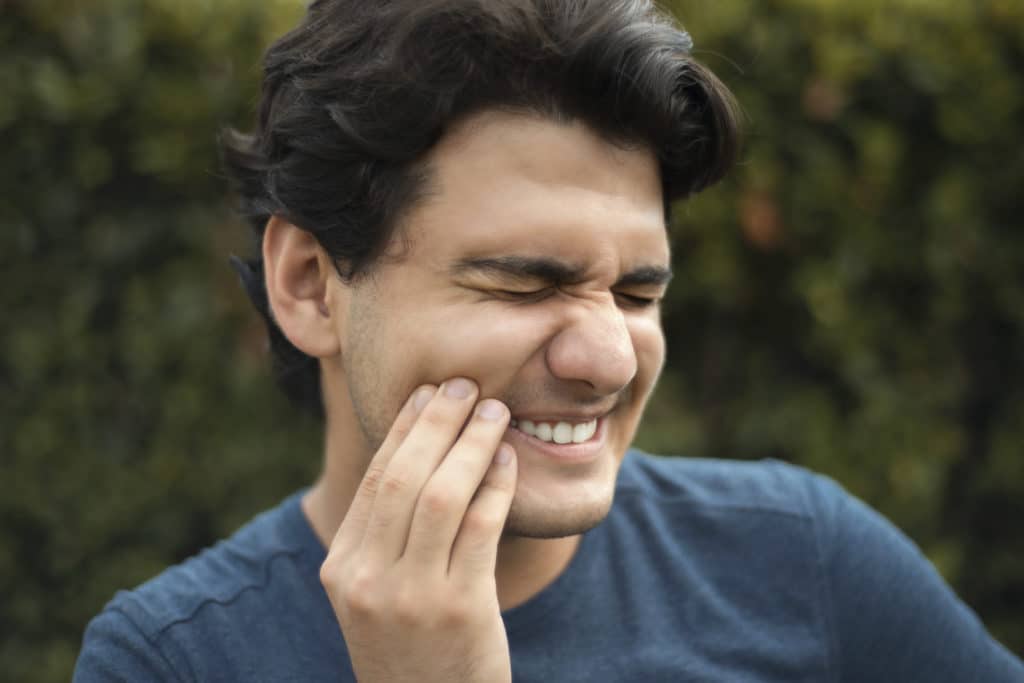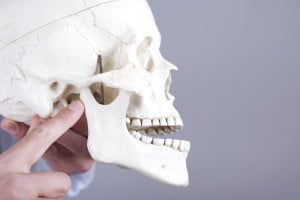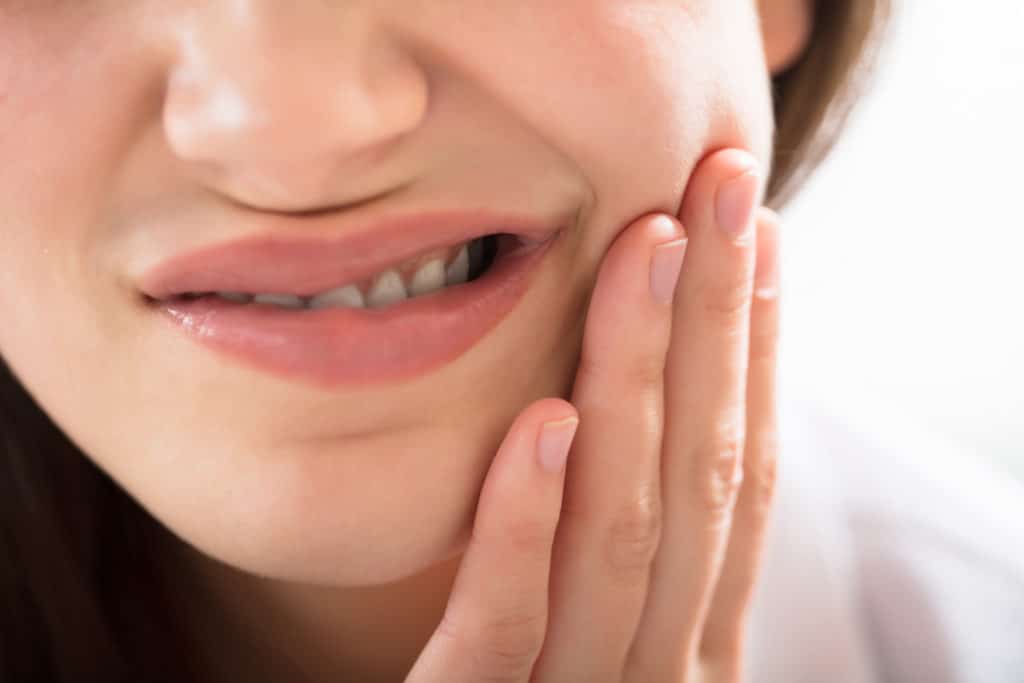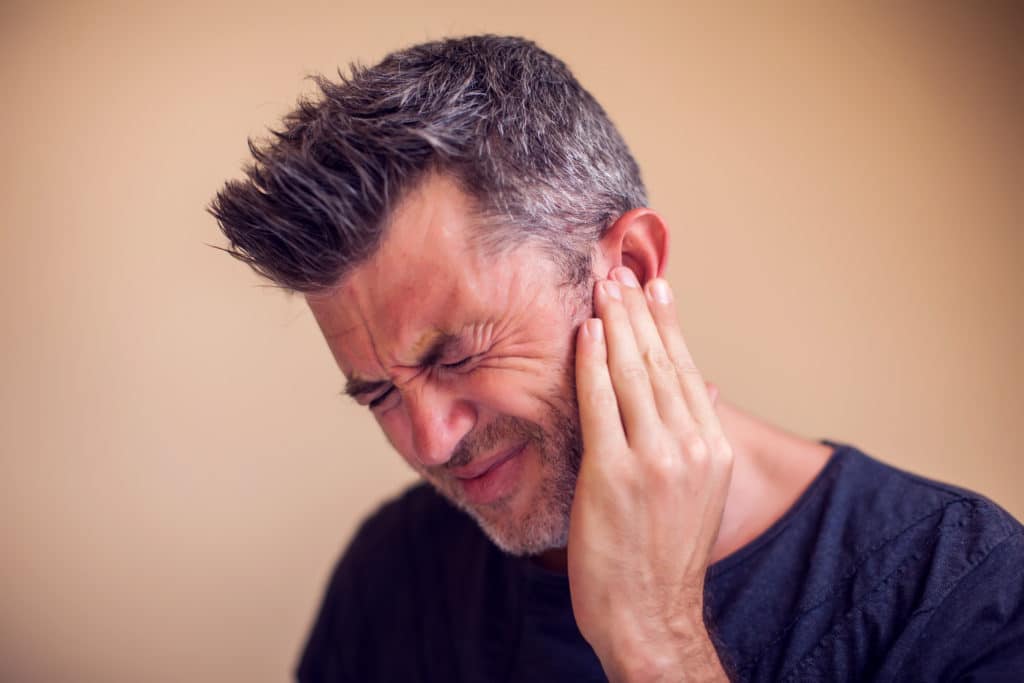Temporomandibular Joint Disorders
The temporomandibular joint is the hinge that connects your jaw to the rest of your skull. To talk, chew, or simply yawn, you need the joint to function correctly. When it doesn’t, you have a temporomandibular disorder (TMJ or TMD). Any TMJ is basically a problem with your jaw and the muscles in your face that control it. At Gentle Dental Care in Edison, NJ we specialize in TMJ therapy and treating both TMJ and TMD
TMJ can be mild, activating only when biting into hard pieces of food and shooting pain through the jaw joint. Or it can be severe, such as when simply opening your mouth causes pain. For obvious reasons, TMJ jaw pain can be very debilitating.
At Gentle Dental, we are often the first line in treating TMJ, as patients incorrectly think the pain is a result of a problem with a tooth. Other patients may first seek out an ear nose throat (ENT) specialist as their symptoms lead them to believe they could have an ear infection. Be sure to give us a call at (732) 549-5660 today to schedule your TMJ consultation with one of our trusted dentists at our Edison office!
What Is TMJ?
Gentle Dental Care’s dental facilities in Edison, NJ are equipped and ready to provide locals with TMJ treatment. Temporomandibular Joint disorders (TMJ or TMD) are a group of conditions that result in jaw pain and that compromise the function of the jaw joint and the muscles that are responsible for jaw movement. In mild cases, biting through hard pieces of food makes the pain shoot through the jaw joint, which can be terribly irritating. For severe TMJ disorders, even eating or talking create so much pain that it becomes debilitating.

What Does TMJ Treatment Do?
TMJ therapies are treatments that seek to eliminate the cause of pain and tightness in the jaw joint. Whenever you have jaw pain caused by the simple function of your temporomandibular joint, this would be considered a temporomandibular disorder. As this joint is critical to everything from talking to eating, jaw pain associated with it can seriously impact your life. Unfortunately, many people don’t bring up their issues with TMJ pain when in our offices, thinking it is not a dental problem.
Patient Testimonial
“thank you Dr. Strober–i came to you in the worst pain with tmj–could hardly open my mouth-and from the tmj , also a broken tooth–your kindness and expertise needs to be addressed. you not only were able to get me out of most of the horrible pain i was in and had my mouth opened and my tooth fixed with a temp crown in a matter of 2 hrs… you took me right away, with great concern and i thank you very much for that. your advertisement says you and your staff are like family..never a truer word spoken–everyone was very nice and concerned and you all work together—- i felt very comfortable and calm after i got there..looking forward to returning for the permanent crown–you are a true credit to your profession– and all of your staff could not have been better—-thank you again, doris behr” – D.B.
Who Should Consider TMJ Treatment?
You might consider seeing a dentist check for TMJ disorder if you experience any pain while chewing, if you feel any pain in the jaw, in the neck or face. Also, TMJ therapy might be recommended for a jaw that locks, or if you feel any painful clicking or popping in that area. TMJ disorders are usually caused by pressure caused by too much grinding and clenching of the teeth, dislocation of the disc and soft cushion between the ball and socket, and cases of osteoarthritis in the TMJ.
Types Of TMJ Treatments At Gentle Dental Care

Usually, when TMJ disorders present themselves as pain in the jaw, patients in Edison NJ would consult with their dentist first. But for less obvious symptoms like headaches, ringing in the ear and neck pain, some residents consult with an ENT specialist since they suspect this might be due to an ear infection. There are 2 types of TMJ therapy, surgical and non-surgical treatments.
Most cases of TMJ are treated by non-surgical methods. These treatments do not cure TMJ disorders but just help alleviate the pain to restore normal function. Your dentist might suggest trying out other treatments before resorting to surgical TMJ treatment.
These are some of our TMJ treatments at Gentle Dental Care:
- Using a Bite Splint – We create a custom-fit bite splint. This is a plastic mouth guard that is placed over your upper or lower teeth to make them slide smoothly against each other, instead of clenching. This relieves pressure on the joint and stops the corresponding pain.
- Physical Therapy – We employ methods to help you overcome muscle clenching. This may involve biofeedback and stretching exercises.
- Medication – Prescribing anti-inflammatory medications helps to reduce the pain, but also to reduce the inflamed muscles that are restricting jaw movement. Other options may be anti-anxiety medications or muscle relaxers.
- Botox – This famous wrinkle reducer works by stopping muscles from contracting. It has proven effective in some TMJ cases.
If these and other options are exhausted, the Gentle Dental team may recommend surgery. There are various procedures that can be performed depending on the severity of your problem. It is important that you consult your dentist so that a personalized treatment plan can be planned for you.
Is Surgery Ever Necessary to Correct TMJ?
In most cases, therapies such as oral splints, physical therapy, and behavior modification usually are effective for managing and calming TMJ. But in more extreme instances, surgery may be necessary to correct structural problems.
- TMJ arthroscopy — If arthroscopy can be used, it is preferred because it creates fewer possible complications. A cannula is placed into the joint space, followed by an arthroscope to provide visuals. Then small surgical instruments are used for surgery.
- Condylotomy — This is surgery to the jaw, but not the temporomandibular joint. This can be effective if the patient is experiencing jaw locking.
- Open-joint surgery — Open-joint surgery is necessary to address structural issues with the joint. In some cases, the articular disc that cushions the jaw joint may need to be replaced with an artificial disc.
Is There Recovery and Aftercare after TMJ Treatment?
In the majority of cases, TMJ is treated with non-invasive options, such as mouth guards, stretching exercises, ultrasound, even Botox injections to relax the muscles involved. None of these treatments require any recovery or aftercare.
The exceptions would be any of the surgeries described above. These are not the usual course except in more extreme cases of temporomandibular joint disorder, but if a patient does require these types of surgeries there will be the usual recovery as with any surgery. The methods used and the individual patient vary widely with what would be required in recovery and any necessary follow-up aftercare.
How Long Does TMJ Treatment Take to Calm my Symptoms?
Again, this varies with the treatment we use at Gentle Dental. Botox injections can provide relief in about four days as the neuromodulator fully relaxes the injected muscle. From there, relief should last 4 to 6 months, but it can be a longer-term solution in some patients.
Other treatments, such as using a bite splint, will take some time. Your jaw didn’t develop the stresses that are creating your problems overnight and relieving them won’t be instantaneous either. By placing your jaw into the correct alignment, gradually the clenching will decrease, and the muscles won’t need to do the extra work that is behind your problems. Physical therapy and jaw exercises will take some time to stretch and release some of the tension. Once Dr. Strober and Dr. Butkofski have a good idea of the cause or causes of your TMJ, we’ll discuss your treatment options along with a timeline that you can expect relief.
Are the Results of TMJ Treatment Permanent?
If we place your jaw into proper alignment that would be a permanent solution to your TMJ pain, as all the stresses creating the muscle and joint tension would be relieved. Solutions as simple as a night mouth guard can deliver permanent relief if you continue to wear the mouthpiece. Surgery, of course, creates permanent changes.
If stress is behind your TMJ, eliminating the issues and having treatment can permanently end your TMJ. But the stress can return and your symptoms along with it.
Once we see you for TMJ at Gentle Dental, we’ll always be on the lookout for signs such as teeth grinding, so you’ll always be one step ahead of where you were before we first saw you for your jaw and face pain.
What Are The Causes Of TMJ?
TMJ/TMD disorders are still somewhat of a mystery to the medical world. Dentists believe most issues arise from muscles that move the joint and from problems with the joint parts. Possible causes are pressure from too much grinding and clenching of the teeth, dislocation of the disc and soft cushion between the ball and socket of the joint, and osteoarthritis in the joint.
The Symptoms Of TMJ
Though finding the exact cause of TMJ jaw pain can be challenging, these are some of the common symptoms associated with the condition:
- Problems when you attempt to open your mouth wide
- Pain in your face, jaw joint area, neck, and shoulder, or around your ears when you use your jaw
- Clicking or popping sounds when you open or close your mouth or chew
- Jaws that lock or get stuck when open or closed
- Trouble chewing or an uncomfortable bite, with the feeling that your jaws are misaligned
- Swelling on the side of your face
- A tired feeling on your face

Other symptoms can involve headaches, toothaches, neck aches, dizziness, earaches, hearing issues, upper shoulder pain, and ringing in the ears. If you are experiencing any of these symptoms, visit Gentle Dental Care in Edison, NJ to be treated.
Can Stress And Grinding Cause TMJ To Develop?
Why one person develops TMJ and another doesn’t isn’t always easy to ascertain. At Gentle Dental Care we’ve found that TMJ is often the result of an issue with the patient’s bite. That can then create a cascade of stresses throughout the jaw and the entire face. But you could also have a new source of stress at work or home, leading you to clench and grind your teeth at night. If you had a jaw injury when you were younger, it can be now be showing itself in arthritis of your jaw joint. As we mentioned above, TMJ has an element of mystery to its exact causes in different patients.
Who Is At Risk For Developing TMJ?
There are several factors that can put a person at a greater risk for TMJ:
- Women 18-44 years of age have a higher frequency of TMJ.
- Poor posture in the neck and upper back muscles may lead to neck strain and problems with jaw muscle function.
- Ongoing stress increases muscle tension, jaw clenching and grinding.
- Patients with other chronic inflammatory arthritis have increased risk.
- People who have had previous jaw trauma or injury.

The Difference Between TMJ And TMD
It comes down to semantics really. TMD actually stands for temporomandibular joint dysfunction. TMJ stands simply for the temporomandibular joint. You see both TMJ and TMD used to describe the disorder. For some reason TMJ became the more-used acronym.
Is Sleep Apnea Related To TMJ?
Research is ongoing on the potential link between sleep apnea and temporomandibular joint disorder. When a person has sleep apnea, the airflow in the back of the throat becomes blocked and the brain senses the problem and wakes the person up. This can happen dozens of times every night.
So, how does this relate to TMJ? Jaw pain is a common indication of sleep apnea. Recent studies have shown that when the throat begins to relax before an apnea episode the jaw reflexively clamps down to prevent the airway from becoming blocked. Over the course of the night, this places excessive stress on the jaw, mouth, neck, and shoulders, telltale signs of TMJ.
Also, improper jaw position, where the lower jaw can be positioned a little too far back can contribute to the airway blockage of sleep apnea.
Can TMJ Cause Tinnitus?
Although this connection is relatively new, it’s thought there are three possibilities on how TMJ may cause tinnitus, which is the perception of noise or ringing in the ears. The chewing muscles are near some of the muscles that connect into the middle ear, so they can have an effect on hearing and possibly tinnitus. Second, there can be a connection between the ligaments that attach to the jaw and one of the hearing bones in the middle ear. Third, the nerves affected by TMJ have connections with parts of the brain that are involved with hearing and the interpretation of sound.

Bottom line? Since the temporomandibular joint is located on each side of your head right in front of your ears, the proximity makes people assume there may be a connection.
Are There Exercises I Can Do to Help Prevent TMJ in the Future?
A misaligned bite can lead to TMJ and there’s little you can do about it other than having Dr. Strober and Dr. Butkofski bring things into alignment. But for other causes, or to prevent a relapse, we give patients these exercises to do at home:
- Relaxed jaw exercise — Place you tongue on the roof of your mouth behind your front teeth. Consciously let your lower jaw relax downward, slightly separating your teeth.
- Goldfish exercises — Place an index finger in front of your ear where your TMJ is located. Put another finger on your chin. Open your jaw either halfway or all the way and feel the slight resistance.
- Chin tuck — Lightly link your hands behind your bottom to push your shoulders forward. Now pull your chin straight back as if you’re trying to create a double chin.
- Jaw resistance — Put your thumb under your chin and create some resistance as you open your mouth. Pinch your chin with forefingers and thumb of both hands to hold it when your mouth is open. Then close your mouth feeling the resistance.
- Tongue up — Hold your tongue up against the roof of your mouth, and then slowly open and close your mouth.
- Side-to-side and forward jaw movement — Place an object that’s about ¼ inch between your front teeth. First move your jaw slowly from side to side with the object between your teeth. Then do the same thing, but this time move your bottom jaw forward so your bottom teeth are in front of your top teeth.
What Happens If I Don’t Treat My TMJ?
Many people think they should buck up and work through their TMJ without professional treatment. They sometimes believe their TMD is simply the result of a phase in life, such as a stressful situation at work. If the stressors are removed, a person’s TMD may resolve itself. But if the jaw is out of alignment, the condition needs treatment. Correction may be as simple as creating a custom nightguard to wear while sleeping to stop teeth grinding and clenching, or treatment may be much more involved. Every case is unique. In extreme cases, surgery could be necessary.
How Does TMJ Affect My Ability To Open My Mouth Normally?
TMJ can have different causes, such as stress. But when the jaw is out of proper alignment it can cause serious issues with the simple act of opening and closing your mouth. Every time you open and close your mouth to chew or talk the temporomandibular joint moves. When it twists or otherwise moves unnaturally this can lead to various problems. An obvious symptom is clicking or popping noises when you open your mouth. This is the joint working inefficiently. Jaw pain when chewing, biting, or yawning can also be an effect of improper joint alignment. In extreme situations, a person’s jaws can actually get “stuck” or “lock” in either closed or open positions.
What Is The Cost Of Treating TMJ?
There is no set cost for TMJ treatment because every case is different. Solutions such as molding a bite splint are inexpensive. Physical therapy costs depend on a patient’s insurance. Medications are the same. Obviously, surgery, if necessary, is the most costly treatment option. The team at Gentle Dental will discuss your TMJ treatment options and their corresponding costs with you.
Contact Gentle Dental Care today or visit us in Edison, New Jersey to begin and learn more about your jaw pain and TMJ treatment options. You can also dial (732) 549-5660 to speak with our office and book your one-on-one appointment with one of our experienced dentists. We are proud to serve patients in Piscataway Township, New Brunswick, Metuchen, and Woodbridge Township NJ and surrounding areas.



